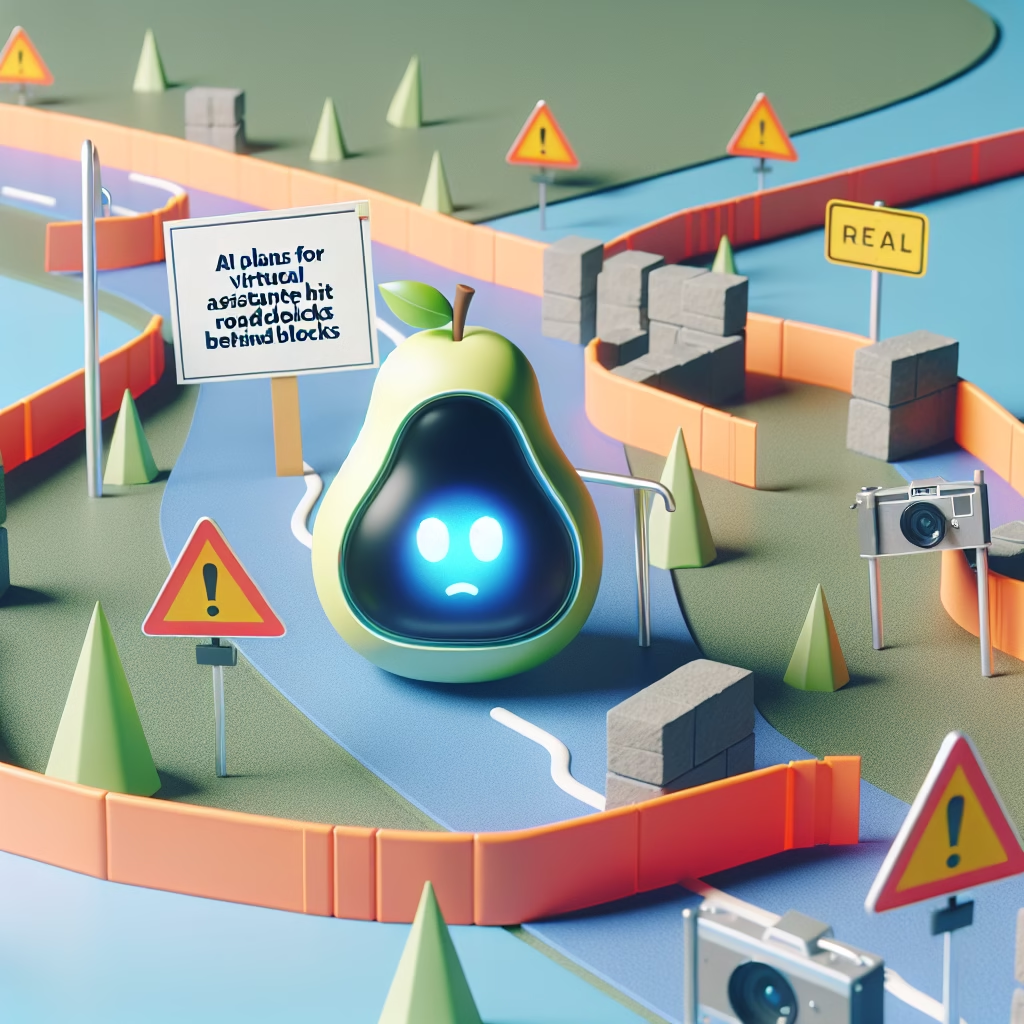# Apple’s AI Plans for Siri Hit Major Roadblocks Behind the Scenes
Apple has long been at the forefront of innovation, but its efforts to integrate artificial intelligence (AI) into Siri seem to be facing significant obstacles. While tech giants like Google and OpenAI continue to push the boundaries of AI integration, Apple appears to be struggling behind the scenes.
In this article, we’ll dive deep into the challenges Apple is facing with Siri’s AI development, what it means for users, and how it could impact Apple’s future in the AI space.
## The Ambitious Vision for AI-Enhanced Siri
Apple initially set out to revamp Siri with advanced AI capabilities, incorporating cutting-edge machine learning and generative AI models. The goal was to transform Siri into a much smarter, more context-aware digital assistant, capable of handling complex queries and delivering personalized user experiences.
With competitors like Google Assistant and ChatGPT demonstrating massive advancements in AI-powered interactions, Apple aimed to close the gap by leveraging its massive ecosystem of devices and software. However, this ambitious plan has not gone as smoothly as anticipated.
## Major Roadblocks Facing Siri’s AI Evolution
Several internal and technical hurdles have reportedly slowed Apple’s progress in integrating AI into Siri. These challenges range from outdated architecture to leadership struggles and resource constraints.
### **1. Siri’s Outdated Codebase**
One of the biggest roadblocks is Siri’s aging and complex codebase. Engineers at Apple have allegedly found it difficult to integrate advanced AI models into the existing infrastructure without causing major errors or performance issues.
– Siri’s original architecture was not designed with large-scale AI advancements in mind.
– Modifying old code to support generative AI has proven to be time-consuming and inefficient.
– Engineers have struggled with slow workflows and debugging challenges.
Unlike Apple’s competitors, which have developed AI assistants from the ground up, Siri’s legacy systems are creating significant bottlenecks in innovation.
### **2. Internal Leadership and Strategy Conflicts**
Another major challenge has been Apple’s internal management and strategic direction. Reports suggest that conflicting visions among leadership teams have made it difficult to set clear goals for Siri’s future.
– AI development at Apple has lacked a unified focus, leading to slow decision-making.
– Engineers have reportedly faced shifting priorities and unrealistic expectations.
– The company has struggled to balance on-device AI processing with cloud-based computations.
While Apple is known for its commitment to privacy, this focus has added another layer of complexity to AI integration. Unlike competitors who rely heavily on cloud-based models, Apple is navigating the challenge of running powerful AI on-device without compromising speed or efficiency.
### **3. Limited AI Talent and Resources**
Apple has also lagged behind competitors in acquiring top AI talent. While companies like Google, Microsoft, and OpenAI aggressively recruit AI researchers, Apple has reportedly struggled to attract and retain the necessary expertise in advanced AI fields.
– The company has made strides in AI research, but deployment remains slow.
– Key engineers have left Apple for AI-focused companies with more flexibility.
– The lack of sufficient AI resources has slowed overall development timelines.
Without the right talent and infrastructure in place, Apple risks falling behind in the AI race.
## The Impact on Apple’s AI Strategy
Given these roadblocks, Apple’s AI strategy may face delays and potential setbacks. However, the company is still investing heavily in AI research and development. A few key areas where Apple is expected to integrate AI advancements include:
### **1. AI-Driven iOS Features**
Rumors indicate that iOS 18 may include more AI-powered features, such as:
– **Enhanced Siri capabilities** that allow for more natural conversations.
– **AI-powered text and voice suggestions** for messaging and emails.
– **Smarter automation and shortcuts** based on user habits.
### **2. AI Integration Into Apple Hardware**
Apple hopes to integrate more AI capabilities directly into its hardware, such as:
– AI-enhanced **photo and video editing** tools.
– On-device AI processing for **faster and more private computing**.
– Real-time AI-powered **translation and accessibility features**.
### **3. Collaboration with OpenAI or Third-Party AI Companies**
To accelerate AI improvements, Apple has reportedly considered partnerships with AI leaders such as OpenAI. A collaboration of this nature could help Apple integrate more advanced AI models without having to build everything from scratch.
## What This Means for Siri Users
For Apple users, these AI challenges mean that Siri could remain behind other voice assistants when it comes to intelligence and flexibility. While Apple still provides a seamless ecosystem, Siri’s capabilities have not evolved as rapidly as Google Assistant or Alexa.
Current Siri limitations include:
– Struggles with complex or multi-layered queries.
– Inconsistent voice recognition and response generation.
– Lack of deep AI personalization and contextual awareness.
However, with Apple expected to unveil significant AI advancements in 2024 and beyond, Siri may still see major upgrades in the coming years.
## Apple’s AI Future: Can It Catch Up?
Despite the challenges, Apple remains committed to AI advancement. The company has the financial resources, technical expertise, and ecosystem advantage to make substantial AI improvements.
The question remains: **Can Apple catch up to the likes of Google, Microsoft, and OpenAI?**
If Apple can overcome the legacy code issues, improve leadership alignment, and secure better AI talent, Siri may still evolve into a world-class digital assistant. But with competitors moving rapidly, the pressure is on Apple to deliver meaningful AI breakthroughs sooner rather than later.
### **Final Thoughts**
Apple’s struggles with AI and Siri development highlight the challenges of building intelligent digital assistants within a tightly controlled ecosystem. While the company’s privacy-first approach is admirable, it adds complexity to AI innovation.
As Apple gears up for its AI-driven future, Siri users and tech enthusiasts will be watching closely to see if the company can successfully overcome these roadblocks—or if it risks falling further behind in the AI race.
What do you think about Apple’s AI struggles? Do you believe Siri will eventually catch up to competitors? Let us know in the comments!< lang="en">







Leave a Reply